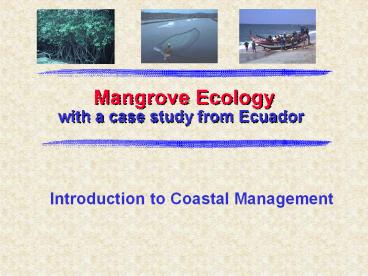Mangrove%20Ecology - PowerPoint PPT Presentation
Title:
Mangrove%20Ecology
Description:
Ecuadorian shrimp farms created by removing mangrove forests along estuarine ... Shrimp Exports to the United States from Ecuador, Panama and Mexico (1977-82) ... – PowerPoint PPT presentation
Number of Views:112
Avg rating:3.0/5.0
Title: Mangrove%20Ecology
1
Mangrove Ecology
- with a case study from Ecuador
Introduction to Coastal Management
2
Mangrove or Mangal
Red Mangroves (Rhizophora mangle)
- Develop only on shorelines protected from wave
action (estuaries, bays, lagoons) - Common throughout the tropical regions of the
world - Typically flooded once or twice per day
- Definition
- Tropical hardwood trees adapted to grow in marine
intertidal environments
3
Distribution of Mangroves
- Generally occur between 30 degrees N.L. and 30
degrees S.L. - Generally follow the 24 degree C. (75 degrees F.)
isotherm of sea surface temperature - Tolerate little or no frost
- Uncommon along arid coasts
Distribution of mangroves (green) in southern
North American and Northern South America
4
Mangrove or Mangal Characteristics
- Low diversity of plant and animal species
- Canopy high and monotonous
- Soils waterlogged and anaerobic
- Substrate variable (muds, sand, rock, organic)
5
Mangrove or Mangal Characteristics
- Mangrove species show characteristics of pioneer
species in their reproductive biology - r-selection properties in finding a habitat
- Mangrove species show characteristics of mature
phase species in aspects of community structure
and vegetative growth - K-selection properties in maintaining habitat
6
Mangrove Specializations
- Most species have some part of root system
exposed to atmosphere - Leaves large, thick, leathery and evergreen
- Many are capable of excreting salts from leaves
- Most cannot be propagated vegetatively
- Most have no growth rings
- All mangroves distributed by water and propagules
float
7
Mangrove Characteristics
Frigate Bird (Fregata magnificens)
- Fauna
- highly variable not characteristic
- insects common
- birds--few
- mud skippers, crabs, oysters, snails
- crocodiles, snakes (few poisonous)
- tiger (Ganges River mangal is refuge)
- deer, raccoon, bats (bats are visitors)
White-tailed Deer (Odocoilus ____)
Raccoon (Procyon lotor)
8
Mangrove Characteristics
- Once the mangrove becomes established
- little structure to the community
- succession not documented
- no understory
- no stratification
- species distributed by edaphic factors (soil
type, soil salinity)
9
Utilization and Exploitation of Mangroves
- Forestry
- boat building an fish traps
- poles
- firewood (charcoal)
- tannins and dyes
- chip and sell as cellulose base
10
Utilization and Exploitation of Mangroves
- Agriculture
- typical agricultural plants cannot survive in
mangrove environments - rice fields
- mariculture (shrimp, finfish, shellfish)
11
Utilization and Exploitation of Mangroves
- Fisheries
- documented as nutrient source for nearshore
fisheries - stabilize shorelines reduce sedimentation into
estuaries - habitat for juvenile fish
- habitat for oysters and shellfish
12
Utilization and Exploitation of Mangroves
- Salt conversion
- Sewage treatment (garbage dump)
- Coastal protection (storm buffer, stabilize
shoreline) - Wildlife management (deer, crocodiles, tigers)
13
Ecuadorian Shrimp Mariculture
- Shrimp farming developed in the late 1960s
- By 1982, 44 of fish exports were shrimp
14
Shrimp Exports to the United States from Ecuador,
Panama and Mexico (1977-82)
15
Tradeoffs for Intensive versus Extensive
Mariculture
16
Solutions?
- Intensify mariculture to increase yields
- Discourage location of ponds in mangroves
- Train extension agents
- Link research and field applications
- Discourage international funding for new sites
- Charge single agency with mariculture management































